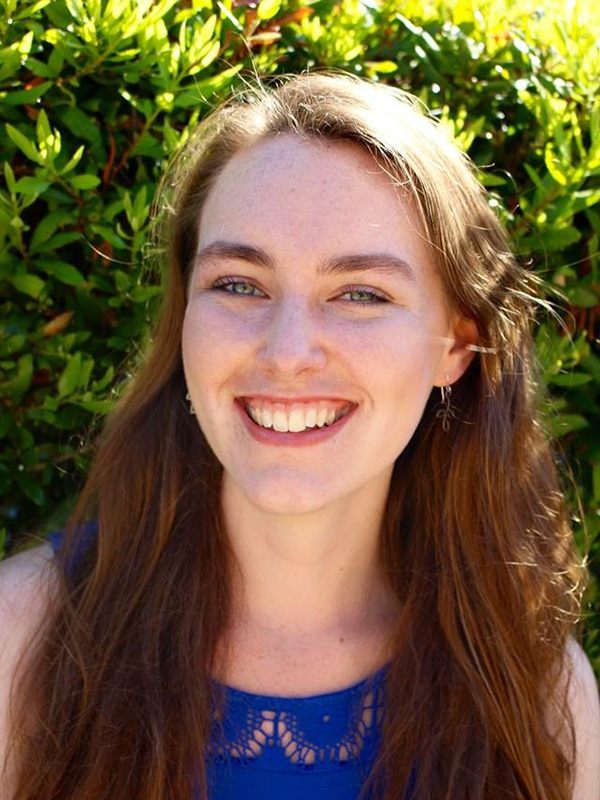Meet our Make a Difference (M.A.D.) Fellows
Make a Difference > Meet our M.A.D. Fellows - Quinci Waller, Louisa Mascuch, Emma Levine, Allison Sugabo, Justine Law
 DONATE
DONATE
The more you give - the more opportunities we have to pay it forward!
All donations to Shotgun Players are fully tax deductible. Our nonprofit tax id number is 94-3265879.
Shotgun Players' Make a Difference program is generously supported by a grant from the Sam Mazza Foundation.
Emma Levine
What was your first Shotgun Players experience?
I was writing a paper on theatre and social change for a class in high school, and a friend of mine who works in Bay Area theatre recommended that I interview Patrick Dooley. Since Shotgun focuses on socially relevant theatre, it fit perfectly. During my interview with Patrick, he suggested I come check out some of Shotgun’s shows, and so I saw their production of Coast of Utopia Part II: Shipwreck. I emailed Patrick shortly after that to ask if I could come volunteer, and I’ve been around ever since.
What made you want to be a MAD fellow? Why Shotgun Players?
I’ve worked with Shotgun before— first as a volunteer, then as an intern, and also as a production assistant on several of its shows. I really appreciated that when I first started working with Shotgun— as a high school freshman and with little professional theatre experience—I still had a voice among the staff. I felt that my opinion was valued. I did a little bit of everything while I was working there in high school—from from painting and sewing to shadowing directors and sitting in on rehearsals to helping manage casting to doing literary research and participating in conversations about selecting plays for the upcoming season. I was excited to come back this summer as the production fellow because it allowed me to focus in on the production aspect of Shotgun, which is something I’ve developed an interest for during my time working here.
What is your favorite Shotgun play and why?
That’s a tough question for me. I love so many of Shotgun’s productions. I’m biased because I worked as the production assistant on the show, but I really loved Shotgun’s production of brownsville song (b-side for tray). I think it’s an important story that so often goes untold. There aren’t that many plays out there about the lives of young people of color who are victims of gun violence. I thought the show was was superbly acted, the set was beautiful, and the lighting and sound design really transported you into the lives of the characters in Brownsville, New York. I’d give a lot to see a production of the play again.
What knowledge do you hope to gain from your fellowship?
I’m currently studying dramatic writing at NYU’s Tisch School of the Arts, and having solid understanding of production and what happens after a script is finished is very valuable for a writer. It’s been a great experience assisting Shotgun’s production manager and also getting a chance to production manage one of Shotgun’s staged readings of a play in development. I’ve learned a lot about the process of fully realizing a theatrical work. There are so many essential things that go on behind the scenes that audience members don’t see. Going forward, I’ll definitely take what I’ve learned at Shotgun and incorporate it into my own writing and directing in a variety of ways—from knowing how to organize and run a production meeting to thinking about the practicalities of staging when I’m writing my own scripts.
What is the one play that you would love for Shotgun to produce?
In high school I visited the Oregon Shakespeare Festival in Ashland, Oregon, and saw their production of Water By The Spoonful by Quiara Alegria Hudes. I instantly fell in love with the play. It deals with so many tough themes—drug addiction, PTSD, familial difficulties, grief, poverty—but Hudes does so gracefully and in a manner that humanizes each of the characters’ individual struggles. The play is complex, and there’s a lot to take on, but I think it perfectly fits Shotgun’s mission in that it tells the stories of people who often remain voiceless and deals with social issues that are important for us to re-examine and talk about.
Why theater?
So many reasons. I believe in theatre’s capacity to humanize, to remind us to exercise empathy and compassion, to call us to action, and to spark social change. I think theatre is a powerful tool that we can use to shed light on societal issues and start conversations about what we can do to make positive changes. By being involved in theatre productions—as a writer, director, producer, actor, and someone behind the scenes—I’ve learned so much about how to effectively tell stories and collaborate with others. For me personally, theatre has been a safe haven since I was little—somewhere I could go to be transported, take part in the telling of beautiful stories and fully be myself.
Can you tell us one fun fact about you?
I’d lived in the Bay Area for my entire life until I moved to New York City for college this past year. So it’s taking me forever to decode and navigate the subway system. For the first several months of living in NYC, I would always go on autopilot and pull out my Metrocard when exiting the subway because I’d forget that I didn’t have to swipe it again like you do when you’re on BART. I still do it sometimes. It’s an ongoing struggle, but I’m slowly getting better at navigating (I think).





